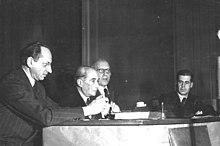Otto Friedrich Bach

Otto Friedrich Bach (born December 22, 1899 in Stuttgart , † July 28, 1981 in West Berlin ) was a Berlin SPD politician.
Life
education
Otto Friedrich Bach was the son of the carpenter Karl Bach. After completing school, he completed a commercial apprenticeship in the paper and stationery wholesale trade from 1915 to 1918.
Employment
From 1921 to 1933 he was involved in setting up the Berlin branch office of the International Labor Office in Geneva under the direction of the former Reich Labor Minister Alexander Schlicke . In the period from 1934 to approx. 1937, Bach administered the legacy of the resistance fighter Robert Keller from the Red Shock Troop, which had been saved abroad, in Geneva . Both men often met for meetings in Geneva. The fact that Bach worked with Otto Ostrowski for another important member of the resistance group after the war and Curt Bley named him as a witness to his illegal work raises the suspicion that Bach was at least a sympathizer of the left-wing socialist collection movement.
During the Third Reich , Bach worked at the employment office in Geneva until 1940. Bach worked at a "Central Office for International Work Design", which was affiliated with the DAF's AWI Institute of Industrial Engineering . In this role he was involved in the looting of the branch of the International Labor Office in Paris in 1941.
From 1941 to 1944 Bach worked in Paris , where he was a member of the board of the German Chamber of Commerce. In June 1944 he was expelled from France by the German Embassy at the instigation of the SD for “subversive attitudes” and in November 1944 he was drafted into the Wehrmacht as a truck driver.
After the end of the war, Bach worked in Hamburg as an interpreter and speaker for the British military commanders in Hamburg-Bergedorf .
Political career

In the Berlin magistrates Ostrowski , Reuter and Schroeder , Bach took over the main office for overall planning. In addition, he headed the economic secretariat in the central committee of the SPD until 1946 .
Public offices
Otto Bach became a city councilor for the SPD as early as 1946 . Four years later he was appointed Senator for Social Affairs by the Governing Mayor Reuter and held this office until Reuter's death in 1953.
In 1954 he left the House of Representatives , but returned in 1958 and was unanimously elected as the new President of the Berlin House of Representatives on September 28, 1961. In March 1967, after almost six years in office, he decided not to run again in the Berlin elections and retired. His portrait bust, created in 1965 by the sculptor Heinz Spilker , is in the collection of the Berlin Senate.
Otto Bach died on July 28, 1981 at the age of 81 in West Berlin.
Bach was buried in the Zehlendorf forest cemetery in Berlin-Nikolassee . The grave is one of the honor graves of the State of Berlin .
family
Otto Friedrich Bach married Ulrike Wissell (1899–2000) on June 7, 1924, the daughter of the German politician Rudolf Wissell (1869–1962).
literature
- Werner Breunig, Siegfried Heimann , Andreas Herbst : Biographical Handbook of Berlin City Councilors and Members of Parliament 1946–1963 (= series of publications by the Berlin State Archives . Volume 14 ). Landesarchiv Berlin , Berlin 2011, ISBN 978-3-9803303-4-3 , p. 60 f . (331 pages).
Web links
- Otto Bach in the Munzinger archive ( beginning of article freely accessible)
- Otto Friedrich Bach on the website of the Berlin House of Representatives
Individual evidence
- ↑ Dennis Egginger-Gonzalez: The Red Assault Troop. An early left-wing socialist resistance group against National Socialism. Lukas Verlag, Berlin 2018, ISBN 978-3-86732-274-4 , ao p. 209
| personal data | |
|---|---|
| SURNAME | Bach, Otto Friedrich |
| BRIEF DESCRIPTION | German politician (SPD), MdA |
| DATE OF BIRTH | December 22, 1899 |
| PLACE OF BIRTH | Stuttgart |
| DATE OF DEATH | July 28, 1981 |
| Place of death | West Berlin |